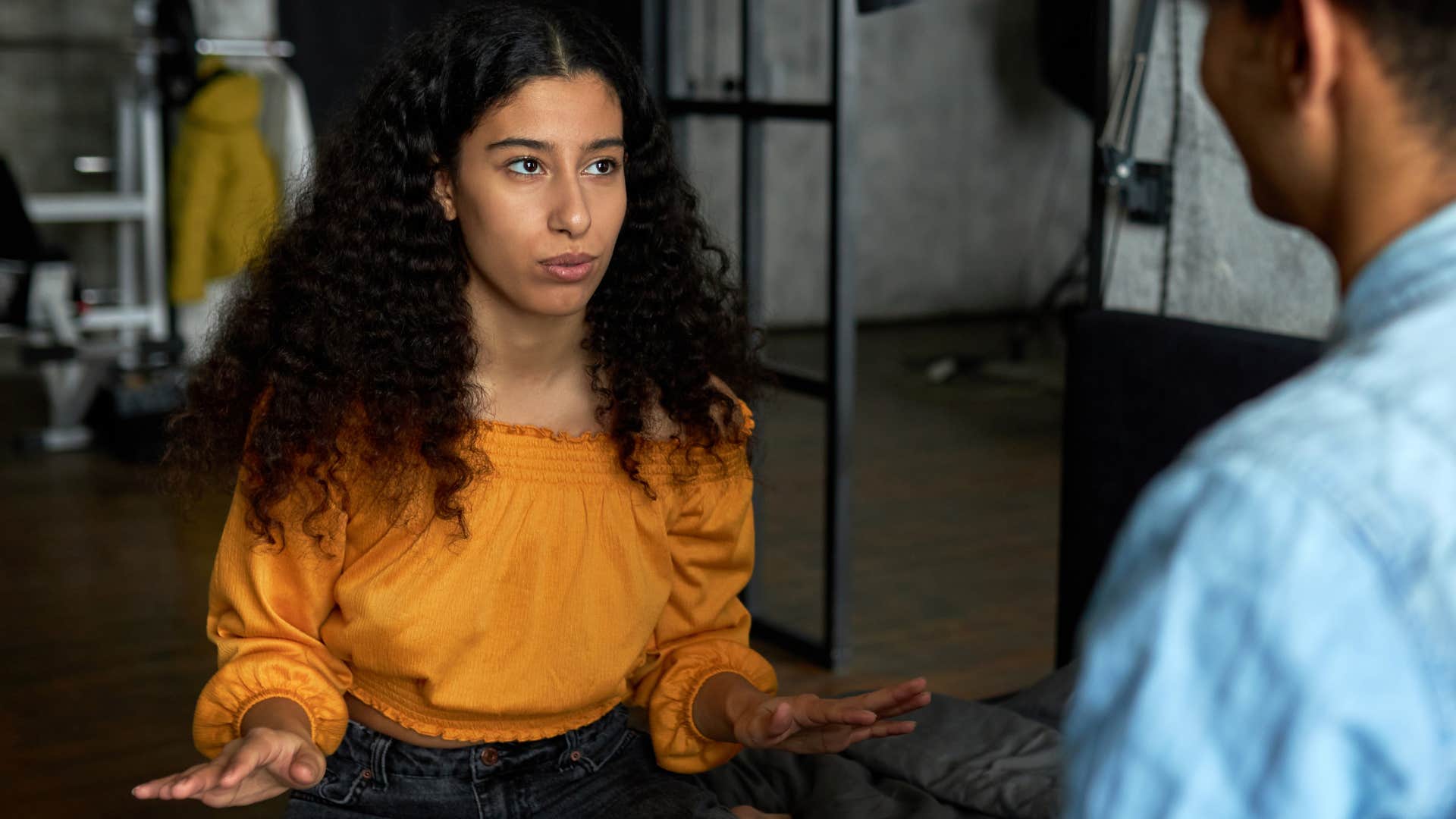11 Things People Say When They're Secretly Afraid You'll Leave Them
A fear of abandonment can easily sabotage a healthy relationship.
 Just Life | Shutterstock
Just Life | Shutterstock It's not uncommon for people to struggle with anxious attachments or a fear of abandonment in their intimate relationships in adulthood, especially if they're struggling with insecurities or emotional turmoil. Many of the things people say when they're secretly afraid you'll leave them are rooted in these fears. They'd prefer to have a misguided sense of control over the fate of their relationships than be caught off guard by someone leaving.
Oftentimes, this fear of rejection and abandonment stems from unresolved trauma or toxic parental relationships early in life, according to a study from the journal Healthcare. Unmet needs and toxic environments growing up spark a cycle of internal low self-esteem, guilt, and shame that tends to manifest itself in adult relationships, urging people to cling onto their partners and adopt anxious attachments.
Here are 11 things people say when they're secretly afraid you'll leave them
1. 'I don't know what I'd do without you'
 Anatoliy Karlyuk | Shutterstock
Anatoliy Karlyuk | Shutterstock
Phrases like "I don't know what I'd do without you" may seem thoughtful and heartwarming on the surface, but they're often one of the things people say when they're secretly afraid you'll leave them. They're anxious about rejection and afraid of abandonment, so they're fishing for reassurance and praise from their partners, rather than communicating openly about these fears.
This kind of fishing, according to counselor Diana Partington, is sometimes harmless, like looking for a compliment or trying to bond with a partner. But it often spirals out of control, promoting codependency and insecurity.
Similar to the ways seeking external validation from friends, peers, and strangers negatively impacts personal well-being, constantly needing it from a partner is similarly divisive. If you can't self-soothe your own anxieties, fulfill yourself, and build your own self-esteem, you'll never find a balance of connectedness and autonomy in a relationship.
2. 'Promise you'll never leave me'
 Tijana Moraca | Shutterstock
Tijana Moraca | Shutterstock
Oftentimes, a phrase like this is jokingly thrown around in conversations and thoughtfully used in a flirtatious conversation. But when it becomes a pattern of language, it's not really "a joke," is it?
There are a number of behaviors and habits that people afraid of abandonment experience in their relationships, according to psychiatrist Steven Gans, from struggling with emotional intimacy to overthinking small things their partner does.
When someone uses a phrase like this — "Promise you'll never leave me" or "Can I count on you to always be here?" — they're not feeding into a stable relationship foundation, they're expressing their anxiety and codependency.
3. 'You'll never find someone like me'
 fizkes | Shutterstock
fizkes | Shutterstock
Jealousy, envy, and insecurity in a relationship are often tied to toxic behaviors between partners. For example, if two partners are unable to resolve conflict, the resentment that lingers can manifest in casual conversations with phrases like this or questions like "Do you talk to other people?"
Insecure partners may weaponize their spouse's fears or try to get reassurance about their own anxieties in subtle ways, rather than having an open conversation about them together.
Like a study from Frontiers in Psychology says, communication is the "heart" of a great relationship. If you're able to share the good and the bad, talk through conflict, and express your needs, there's nothing you can't overcome together.
4. 'Are you mad at me?'
 GaudiLab | Shutterstock
GaudiLab | Shutterstock
The age-old question of "Are you mad at me?" is more controversial than you might think. Not only does it exacerbate already present tensions and frustrations, it tends to ironically dismiss open communication. If you notice someone is upset, having a conversation with them is important, but accountability and self-reflection should be the first steps.
This question is one of the things people say when they're secretly afraid you'll leave them because they'd prefer not to self-reflect and figure out what they might've done. It's a truth too uncomfortable and anxiety-inducing to acknowledge in the face of their fears of abandonment and rejection.
5. 'You'd be better off without me'
 Chay_Tee | Shutterstock
Chay_Tee | Shutterstock
Once again, many of the things people say when they're secretly afraid you'll leave them are all about fishing for praise, pity, and reassurance. They'd prefer to prompt their partner to give them a compliment or reassure them, rather than finding internal confidence and security or even reflecting on how they can show up better in their relationship.
Fishing for reassurance only breeds codependency, which might feel comfortable for someone with an anxious attachment, but only sparks resentment, guilt, and disconnection over time.
6. 'I know I can be a lot sometimes'
 SUPERMAO | Shutterstock
SUPERMAO | Shutterstock
Self-doubt in relationships is impossible to avoid, but when it's the underlying theme behind every argument, conversation, and interaction, it can take a toll on both partners' emotional well-being. Phrases like this are often used by people battling self-doubt and insecurity — they try to overcompensate for their perceived faults by fishing for reassurance or pity.
According to therapist Janet Brito, open communication can often help mitigate the negative thought patterns and depression that tend to flourish alongside insecurity. So if you're battling insecure thoughts or dealing with an insecure partner, focus on healthy communication.
Show up for yourself, have the hard conversations, and don't let phrases like this become the only way either of you finds and offers affection, love, and reassurance.
7. 'If I were you, I'd leave me too'
 fizkes | Shutterstock
fizkes | Shutterstock
Phrases like "I'd leave me to" may feel subtle and unsuspecting, but they're often a big reveal into the inner workings and emotional turmoil an insecure partner grapples with. When a partner uses this to seek validation or reassurance, what they're really doing is burdening their partner with stress — urging them to "fix" their insecurities and overcompensate for their self-doubt.
You can't find true love or build a strong connection with someone by pushing them into offering up love and affection. You can build a misguided codependent relationship by using phrases like this, but that only builds resentment, anxiety, and mistrust over time.
8. 'You never post about me'
 simona pilolla 2 | Shutterstock
simona pilolla 2 | Shutterstock
According to a PLOS One study, partners who post frequently online and share their relationships on social media tend to be more unhappy than those who don't. Yet, many couples tend to argue about social media often in their relationships, upset about not being shared on social media feeds and having a spot on a curated feed.
A phrase like this is often used in these relationships, but it can also be a sign of someone secretly afraid of abandonment, as they want something concrete, like a social media post, to reassure them that their relationship is strong.
However, truly strong relationships have nothing to do with social media and everything to do with honesty, open communication, and affection. If you can cultivate all of those fundamentals at home and offline, there's often little tension when it comes to social media.
9. 'I don't want to hold you back'
 Prostock-studio | Shutterstock
Prostock-studio | Shutterstock
Insecure partners with anxious attachment styles often seek reassurance with misguided phrases like this one. Rather than offer affection, invest in healthy communication, and openly express their needs, they try to sidetrack vulnerability and seek those things out by overcompensating.
They let their self-doubt, envy, and insecurities spiral out of control. And this, in turn, pushes their partner away, even when they're attempting to latch on.
10. 'I wouldn't be surprised if you left me'
 bbernard | Shutterstock
bbernard | Shutterstock
Even when they're not intentionally trying to be, phrases like this can manifest as emotional manipulation in an insecure partner. They're pushing their partner to take on the burdens of their own self-doubt, asking them to overcompensate for their lack of communication skills and internal security.
The key to steering away from a codependent and unhealthy relationship is confidence. If you can reassure yourself, remind your partner of your needs, and set boundaries, there's no reason to use phrases like this to cope with fears of abandonment or rejection.
11. 'Are you still happy?'
 Geber86 | Shutterstock
Geber86 | Shutterstock
Often interpreted as manipulative or passive-aggressive, a question like "Are you still happy?" can often spark more conflict and resentment than bonding in a relationship. A partner who feels the need to check in on their partner's feelings and emotions from a genuine and grounded perspective may choose "How can I better support you?" or "I've noticed a change in your energy, is there anything I can do?" to find a better balance.
However, insecure partners who lack that relationship awareness and internal stability resort to accusatory questions like this, pushing their partner away, despite secretly being afraid they'll be left by themselves.
Zayda Slabbekoorn is a staff writer with a bachelor's degree in social relations & policy and gender studies who focuses on psychology, relationships, self-help, and human interest stories.

